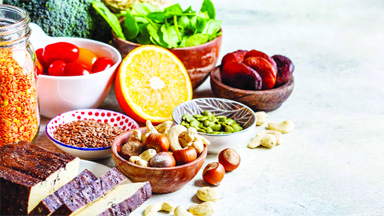Did you know that a squeeze of lemon in your greens or dal isn’t just for taste? It actually supports your iron levels. Even a small amount of Vitamin C — like 100 mg taken with a meal — can increase the absorption of iron from plant foods by more than 60 per cent.
Pairing nutrients for better absorption isn’t just theory — it’s something we consistently see backed by research. How well the body takes in vitamins and minerals can improve noticeably when certain combinations are used.
This holds true for turmeric as well. Curcumin, its active ingredient, isn’t easily absorbed on its own. But when paired with black pepper — because of the piperine it contains — absorption improves sharply. Some studies show this can raise its bioavailability by up to 2,000 per cent. So what’s often thought of as a traditional kitchen habit is, in fact, a powerful example of how the right pairing can make all the difference in how our body uses what we eat.
HOW NUTRIENTS BACK EACH OTHER UP
Vitamin D and calcium are another well-known pair. Without adequate vitamin D, the body can only absorb a fraction of the dietary calcium. Meanwhile magnesium plays a crucial role in converting vitamin D into its active form — without it, even supplements may be less effective. Additionally, fat-soluble vitamins like A, D, E and K need dietary fat for proper absorption; hence, they should be taken with meals that include healthy fats such as ghee, nuts and fish.
AVOIDING CONFLICTS
These principles aren’t difficult to apply — they can be woven into everyday eating with a little mindfulness. If supplements have been medically advised, understanding when and how to take them is just as important. Fat-soluble vitamins work best with meals that include healthy fats, while iron is often paired with vitamin C but should be kept separate from calcium. Magnesium and calcium should ideally be spaced out to avoid absorption conflicts.
These small adjustments — timing, pairing, and food context — can significantly improve how well the body utilises each nutrient. Following your doctor’s instructions and not self-medicating is key to getting the intended benefit.
NO SUPPLEMENTS WITHOUT MAKING ADVICE
That said, it’s important not to start adding supplements on your own without medical advice. They’re meant to address specific needs — not to follow trends or assumptions.
Taking unnecessary doses can upset your body’s nutrient balance and sometimes lead to side effects. In most cases, your body responds better to nutrients from real, well-paired foods than from isolated capsules. For generally healthy individuals, combining lentils with vitamin C or having fat alongside fat-soluble vitamins is a simple, effective way to support absorption.
Why vitamin C can increase iron absorption from plant foods
